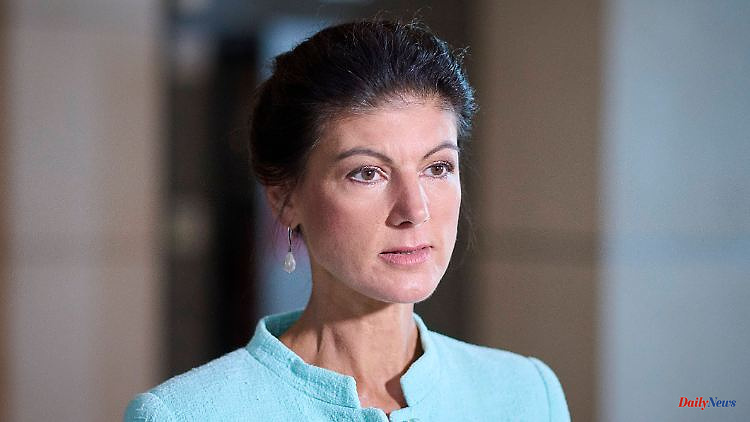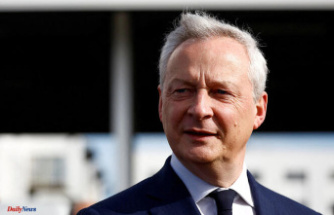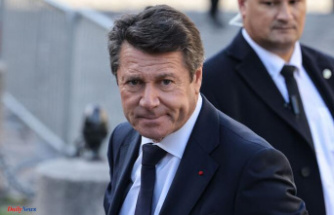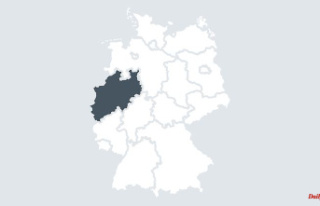The "Peace Manifesto" published by left-wing politician Sahra Wagenknecht and publicist Alice Schwarzer continues to cause criticism. On Tuesday evening, one of the authors will take part in the discussion with Markus Lanz - and try to explain why she considers a negotiated solution to be realistic.
The AfD reacted positively, parts of the left are angry, more and more German citizens support it: the "Manifesto for Peace" by the publicist Alice Schwarzer and the left-wing politician Sahra Wagenknecht. The latter is a guest of Markus Lanz on ZDF on Tuesday evening. There she has to face a critical discussion - as well as some questions that she cannot always answer satisfactorily. In their "Manifesto for Peace", which has meanwhile been signed by a good half a million German citizens, the authors call for immediate initiatives for peace negotiations. With this they want to end the war in Ukraine for the time being.
The current world situation is dangerous, says Wagenknecht. The State of the Union address given by Russian President Vladimir Putin on Tuesday morning was a war speech, but US President Joe Biden's signals are just as dangerous. He still only goes the military route. "It's escalating on both sides. And this world, which is full of nuclear weapons, can't afford that." The western community of states has the responsibility to do everything to bring the war in Ukraine to a quick end.
Wagenknecht admits that neither the Russian nor the Ukrainian side is willing to negotiate at the moment. "It is now a question of countries that are not directly involved in this war starting peace initiatives. Fortunately, the West is not yet a direct party to the war. Unfortunately, we are being drawn more and more into this war." That is why it is the task of the West to make a peace offer and to press for peace talks instead of supplying more and more arms. "If Russia then rejects these peace talks, there are many other things that I can talk about. But we have to try first!"
At the end of the program, Wagenknecht also describes how such a peace proposal could look like in her imagination: First of all, there should be a ceasefire on both sides. He would then have to be monitored by UN blue helmets. Ukraine must maintain its neutrality and must not join NATO or the EU. Residents of the four Ukrainian territories claimed by Russia were to vote freely on which country they wanted to belong to. At the end there could be a peace treaty. Sounds kind of easy. Previous attempts at peace negotiations have always been blocked by the West, Wagenknecht claims. "Putin is doing it just as wrongly as we are. But that's no argument against trying."
Born in Odessa, Ukraine, Russian journalist Marina Ovsyannikova is furious. She became known through a protest action on March 14 last year: The editor, who worked for state television, presented a poster on the main news program in which she called for the end of the war. "Who do you want to negotiate with?" she addresses Wagenknecht directly. Putin is a war criminal who wants to exterminate the Ukrainian and Russian people and who should be court-martialled. "I'm in mortal danger because I want to fight him and you say we have to negotiate with him." You can't talk about that in the current situation, says Ovsyannikova, and demands: "You have to dismantle the Putinian system." Putin is an aggressor, you can't talk to an aggressor.
Ludmyla Melnyk from the Institute for European Politics also sees no negotiation options at the moment. She criticizes Wagenknecht: "You fuel the illusion that we will no longer have a conflict once the negotiations take place." But that is wrong: Putin would never allow democratic development in Ukraine.
"What would be your solution to the conflict?" asks Wagenknecht.
The scientist's answer: "My solution is that Ukraine does not make any concessions."
Of course, this war will end with negotiations, says SPD General Secretary Kevin Kühnert. He is of the same opinion as Wagenknecht. But he criticizes that Wagenknecht and Schwarzer do not take Ukraine's interests into account in their manifesto. They treated the country "like a game piece that is moved back and forth in international politics". Ukraine must be able to negotiate from a position of strength and defence. "You don't have it because you enjoy shooting, you have it to have a bargaining chip against your partner."
The discussion will continue in the coming days. Because in the meantime politicians and scientists have published a "Manifesto against the Manifesto".












